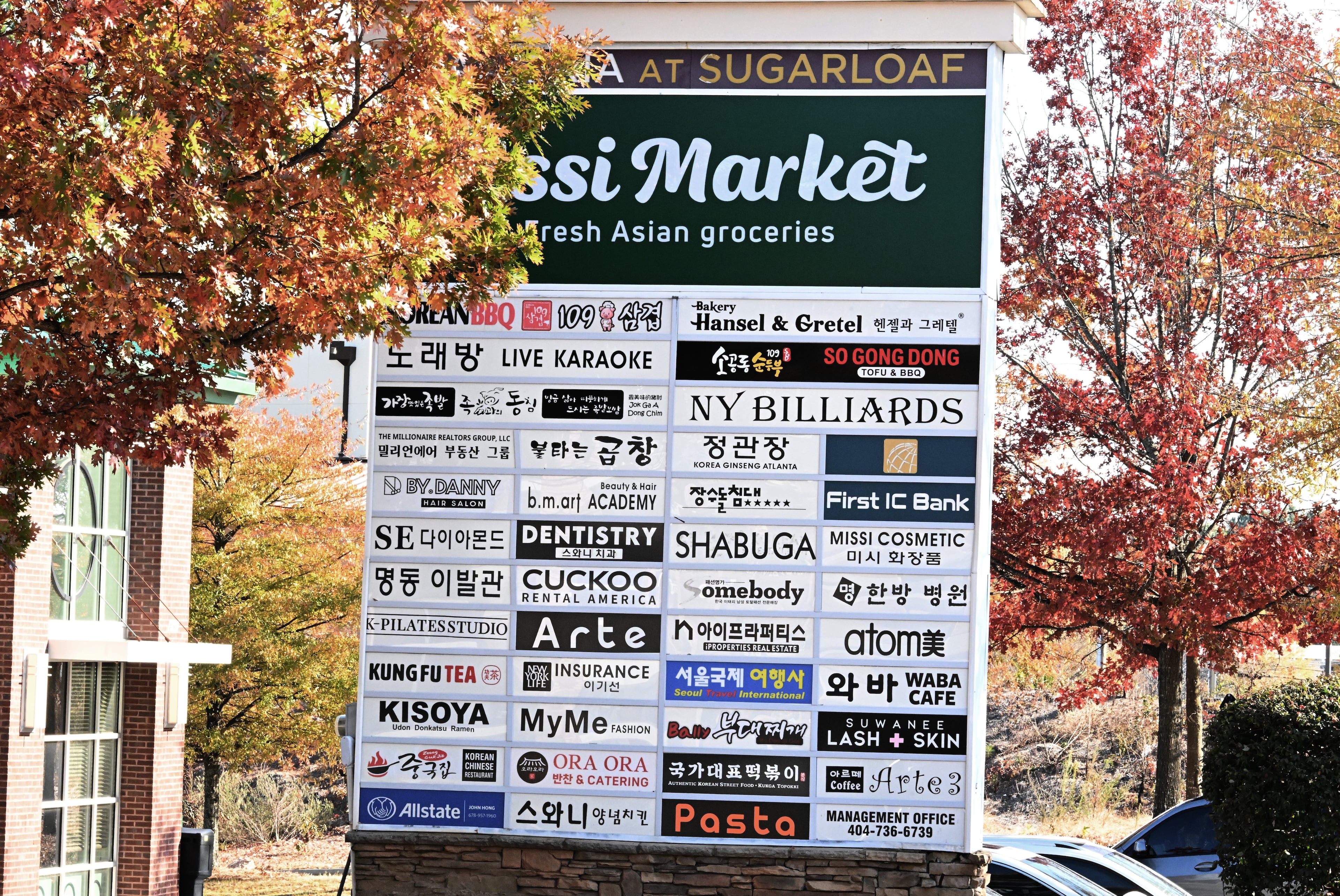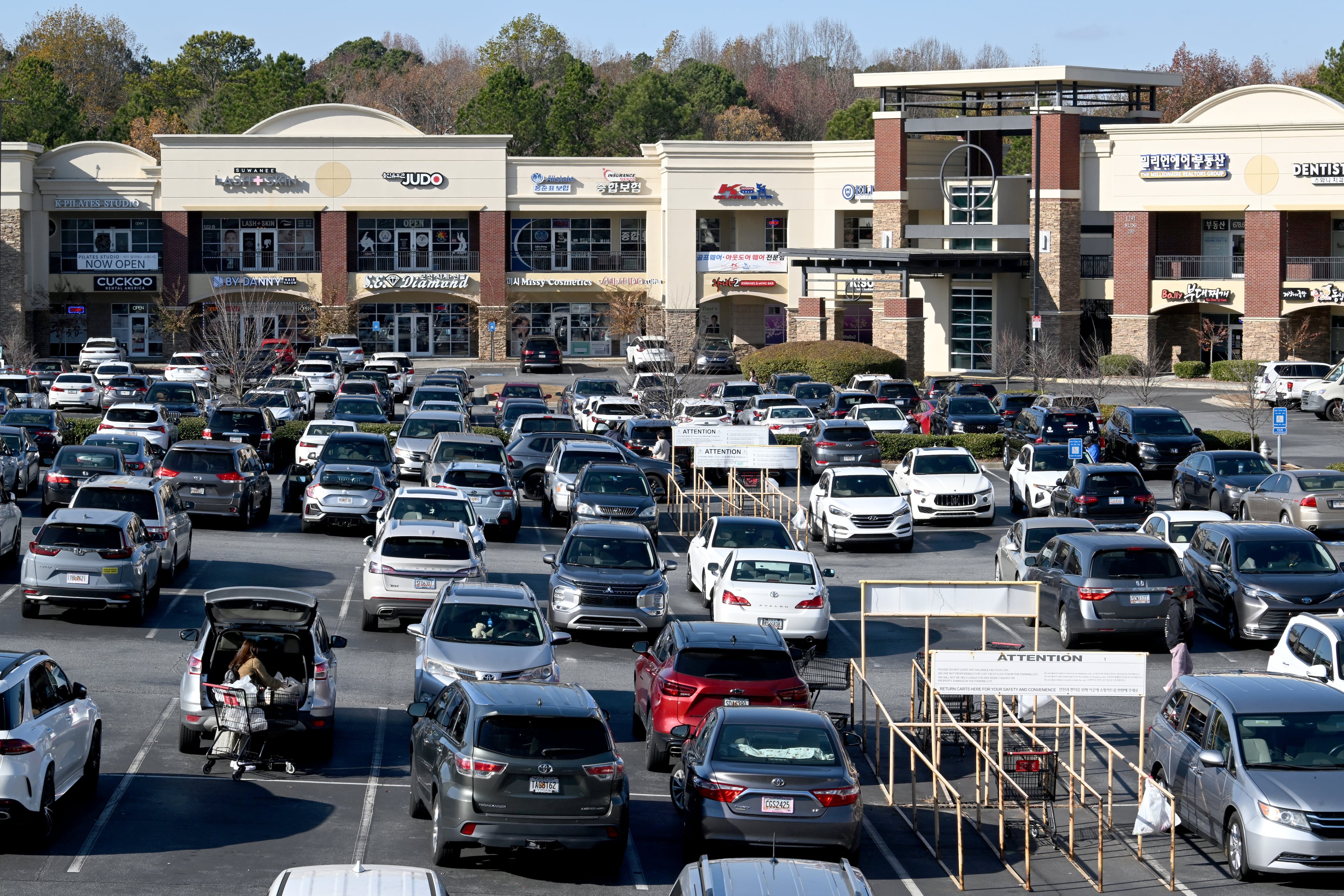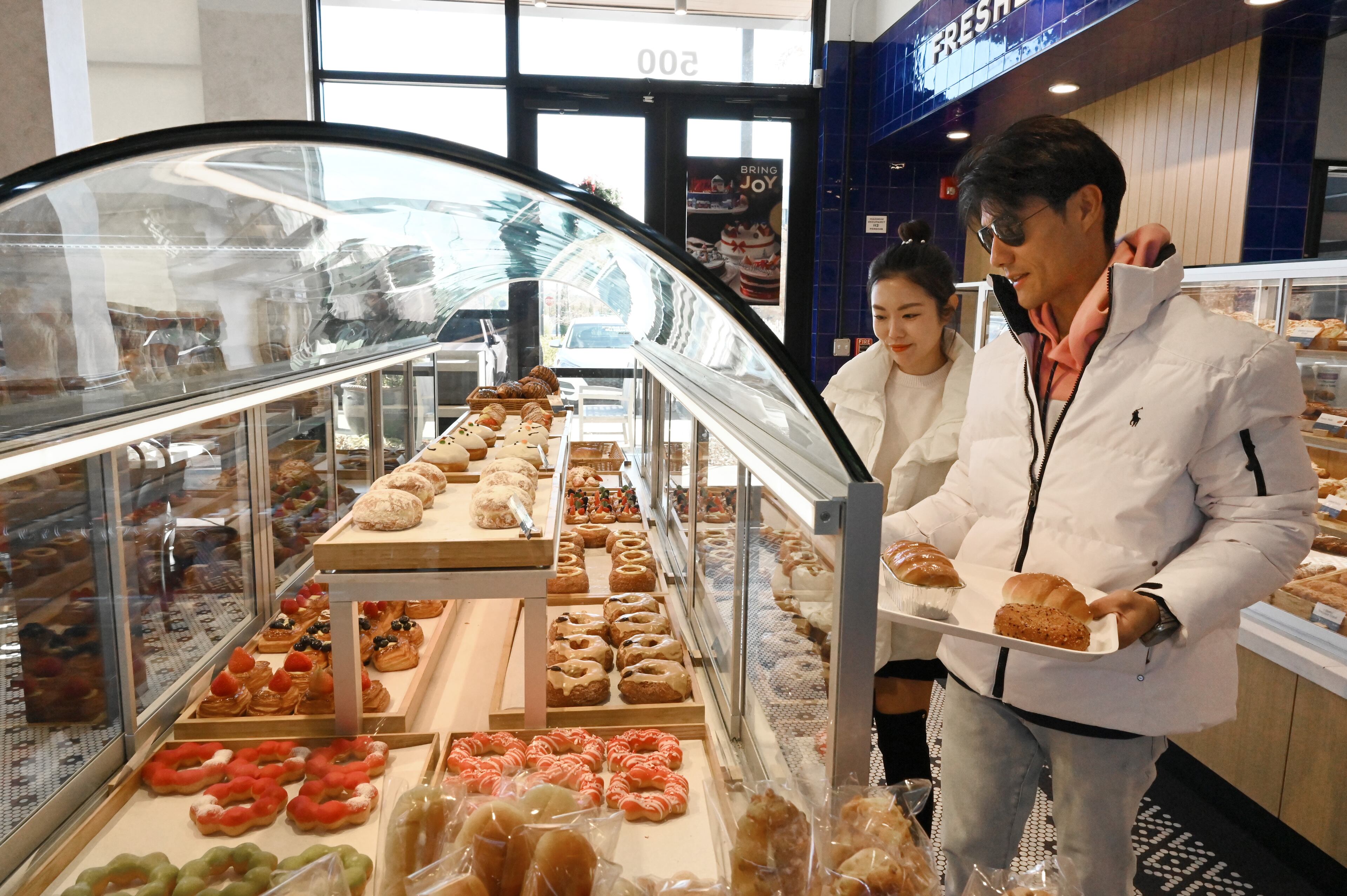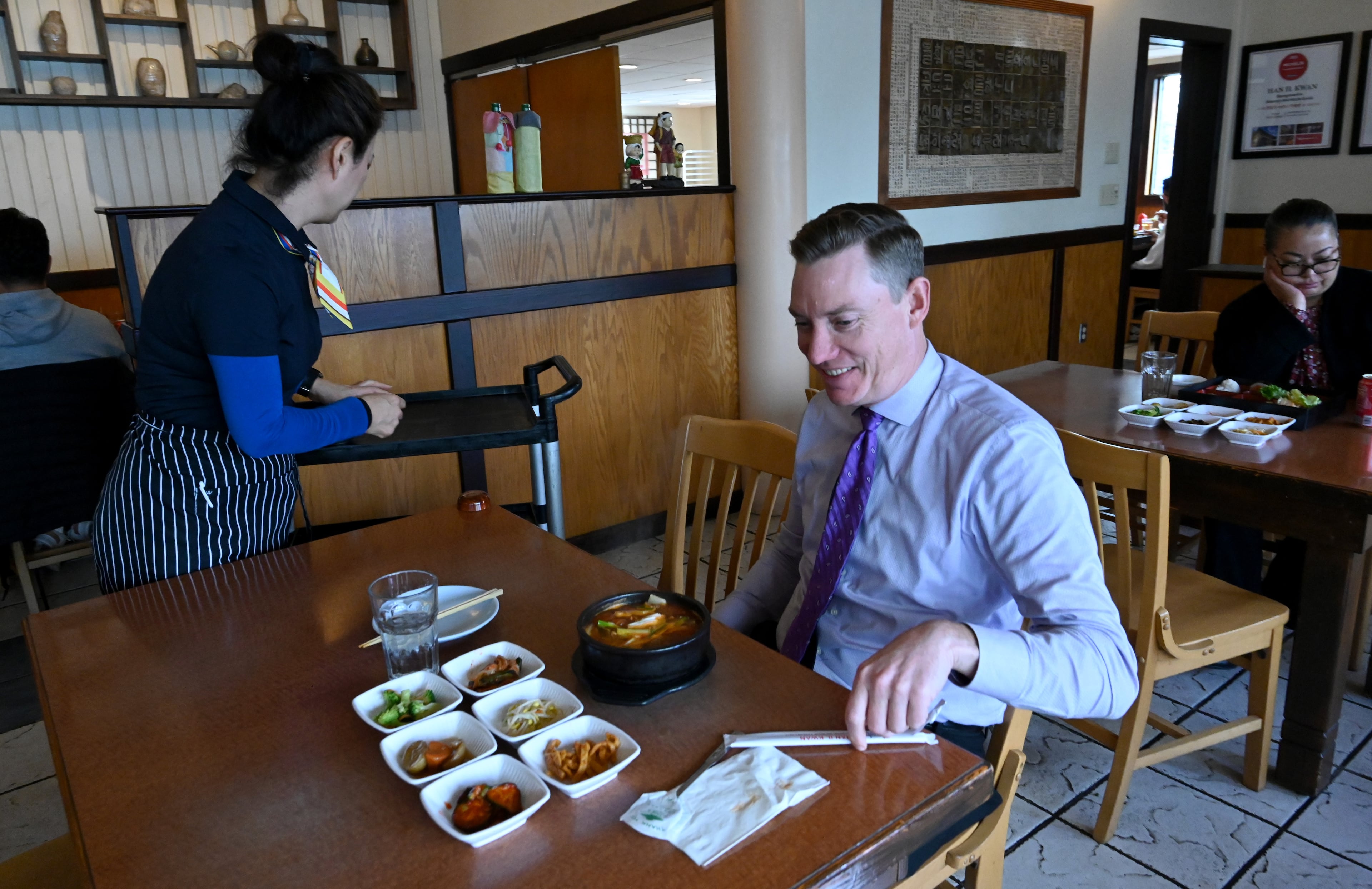Atlanta’s Koreatown has been moving north for years. Here’s why

Sang-Mu Yi, 67, watched favorably as a couple from Buckhead enjoyed jjamppong, a spicy noodle soup, for Saturday lunch at her Korean barbecue restaurant, Han Il Kwan, in Doraville.
Adding the Chinese-influenced soup to the menu was a survival move, she said, as Korean restaurants disappear from the stretch of Buford Highway near I-285 that was once the center of gravity for Georgia’s small but bustling Korean community.
“While we specialize in KBBQ, a lot of customers started looking for Korean-style Chinese cuisine when Yen Jing closed,” she said, referring to a beloved but now closed restaurant nearby. Yi is also catering to people with tastes for Japanese foods with Korean influences.
“There aren’t that many Korean-style Japanese restaurants anymore, so we also added a Japanese box set,” she said.
Buford Highway in Doraville was Atlanta’s premier Koreatown for decades, where Korean grocers, chefs and clothiers opened shop in low-slung shopping centers in the 1980s. Businesses along a 3-mile stretch of the corridor proliferated over the next couple decades as the world’s attention turned to Atlanta for the 1996 Summer Olympic Games, and as South Korea strengthened its political and business ties with the U.S. and Georgia.
Now, only a handful of Korean restaurants are left as merchants close shop and take their business — and your favorite Korean food — farther north into Gwinnett County.
Duluth, about 10 miles to the north, now boasts the largest Koreatown in Georgia and the Southeast, encompassing all aspects of marketable Korean culture from restaurants serving K-food, aesthetic cafes playing K-pop and skin care clinics promoting K-beauty.
“A new restaurant pops up (in Duluth) every morning you wake up,” said Yi, who owns several restaurants in Duluth, Suwanee and Doraville. And more continue to crop up along I-85 toward Suwanee as Koreans settle farther north into Gwinnett County, home to the highest percentage of Koreans in the Southeast.

The Atlanta Journal-Constitution spoke with about a dozen Korean business owners, residents and real estate experts who pointed to a multitude of factors for the shift, including commercial real estate affordability and space, quality of school systems and a booming Korean population and K-pop craze that has driven demand for Korean food to new heights.
The Original Koreatown
Korean immigrants began to develop off Buford Highway in Doraville around the same time Georgia’s Department of Economic Development opened its first office in Seoul in 1985. They found affordable land and opportunity to start their businesses once word spread of some landlords willing to rent commercial space to immigrants. One of those landlords was Halpern Enterprises, which owns a large portion of the commercial space on the corridor.
“My father was an immigrant to this country and I believe no one appreciates opportunity in the United States more than immigrants do,” Halpern Enterprises Chairman and CEO Jack Halpern said. “We were willing to take chances on people who did not have an impressive credit history but were willing to work hard to make the business succeed and give their family a chance to a new life in America.”

As Buford Highway’s demographics shifted from predominantly white, blue-collared workers at Doraville’s General Motors Assembly Plant to immigrant entrepreneurs, Halpern stitched together a plan to create Georgia’s first Koreatown after touring Los Angeles’ Koreatown in the 1990s.
“The critical elements I was told (from touring L.A. Koreatown) was a bank that catered to the immigrant community, a large grocery store, so I recruited the Buford Highway Farmers Market and restaurants,” he said. “If you had those elements, it would become the immigrant shopping area for Atlanta and that’s what came to pass.”
More immigrant communities including Chinese, Vietnamese and Latino flocked to an 8-mile stretch of the corridor, from roughly Clairmont Road to Jimmy Carter Boulevard. When the 1996 Summer Olympic Games put Atlanta on the world map, Buford Highway became the immigrant hub of the South.
It wasn’t long before Korean businesses like Kimchi Myeongawon, which would later become the KBBQ chain Iron Age after moving to Duluth, began to look for more space and affordability elsewhere.
“We ran out of room,” Halpern said. “Real estate tends to be more affordable the further away you get from the city, so it was sort of a natural evolution for businesses to move north on Buford Highway and Peachtree Boulevard.”
The center of the Atlanta metro's Korean population has moved farther northeast, according to an AJC analysis of Census data from 2013, 2018, and 2023.
Korean population %
Chart: Jennifer Peebles, The Atlanta Journal-Constitution
Source: U.S. Census Bureau American Community Survey
Moving up
Gwinnett Place is a cluster of mostly Korean restaurants and businesses concentrated in 2,000 acres near its namesake mall just off I-85 in Duluth. From Korean traditional spas called jjimjilbangs to supermarkets and cafes, Gwinnett Place is the center of today’s Koreatown.
The Gwinnett Place Community Improvement District was created in 2006 to revitalize business and improve infrastructure and public safety. It is now one of six self-taxing CIDs in Gwinnett County, and home to about 7% of all jobs in the county.
Joe Allen, executive director of the Gwinnett Place CID, pointed to the county’s “good government, fairly low taxes, excellent schools, great infrastructure” that encouraged both families and businesses to settle up north around the time the CID was created.
Thirteen out of the 15 top ranked public high schools in Georgia, according to school-ranking site Niche, are located in Gwinnett and neighboring north Fulton and Forsyth counties. The quality schools were a draw to immigrant parents raised in a society that values education, many members of the Korean community told the AJC.
“Everything is there to grow and have a business that will thrive and that’s what’s attracted so many people of varying nationalities from across the country and the world,” Allen said.

And the demand for Korean food and culture is only growing thanks to a rapidly growing Korean population.
The Asian American population in Gwinnett County has nearly tripled since 2000, according to U.S. Census Bureau data, and the county’s Korean population increased by 40% since 2010. The state is now home to more than 150,000 Korean Americans, according to the Consulate General of South Korea in Atlanta.
South Korean conglomerates are also bringing significant investments to Georgia with Hyundai’s $7.6 billion Metaplant near Savannah expected to employ 8,500 workers. SK Battery America’s $2.6 billion EV battery plant employs more than 3,000 workers in Commerce, just 45 minutes north of Gwinnett Place.
“We hear from our hotels that a lot of times, executives and family members on the weekends will come in at Sonesta (hotel) and then come (to Gwinnett Place) for their dining and entertainment before they head back to the automotive plant in Savannah,” Allen said.

To track Koreatown’s growth, one only has to look at Paris Baguette, a popular Korean bakery-cafe chain based in Seoul with more 200 locations in more than 20 states in the U.S. Paris Baguette opened its first Georgia location in Doraville in 2013, traversed 10 miles up I-85 to Duluth in 2016 and most recently opened locations farther north near Buford and Suwanee, which is home to the census tract with the highest percentage of Koreans in the state.
Nick Scaccio, Paris Baguette America’s chief operating officer, called Georgia an exciting market where the franchise plans to open 15 new locations over the next several years in areas including Alpharetta, Johns Creek, Cumming and Savannah.
“We are definitely in tune with monitoring population growth, up-and-coming markets and transitions of businesses in various areas across the U.S.,” he said. “All of those factors help us make informed decisions in terms of trade area and site selection.”
Surviving in a disappearing Koreatown
Despite the unprecedented growth in Korean population and business in Gwinnett County, some business owners still see opportunity in Doraville’s original Koreatown.

Yi, the owner of KBBQ restaurant Han Il Kwan, said the key to surviving along Buford Highway is to tailor the menu and service to non-Koreans, who make up about 75% of her customers.
“We’re in a generation where if there’s anything that includes the letter ‘K,’ people are intrigued,” Yi said.
She’s referring to the global obsession over KBBQ, K-dramas, K-beauty and the biggest ‘K’ of all: K-pop. Atlanta has become a major hub for K-pop fans as the only Southeast stop for many K-pop concerts in the U.S., spreading awareness of Korean culture and driving demand for Korean food.
Since taking over Han Il Kwan in 2020, Yi has added Korean dishes more familiar to Westerners like the spicy noodle soup jjamppong, black bean noodles called jajangmyeon and spicy rice cakes called tteokbokki to the menu. The prestigious Michelin Guide took notice, adding Han Il Kwan to its list of recommended restaurants, which has boosted sales.

Mindy Kim, Mozart Bakery manager in Doraville, similarly attributes her cafe’s success to the diversity in customers, from Korean seniors who stop by every Sunday after mass to a group of Americans that convenes every Saturday to learn Korean.
“The fact that we can become a kind of hub for anyone interested in Korea, Korean food and even the Korean language is meaningful,” she said. “The multicultural aspect of Buford Highway is what makes it have more opportunity for business.”
And the convenience of being just 20 minutes from Atlanta or Marietta is one of the biggest selling points for those still holding out for the disappearing Koreatown.
“People who live in Marietta or Atlanta would rather come here for Korean food, not go all the way up to Duluth,” Yi said. “So I’m still betting on Buford Highway.”
— Data reporter Jennifer Peebles contributed to this story.



